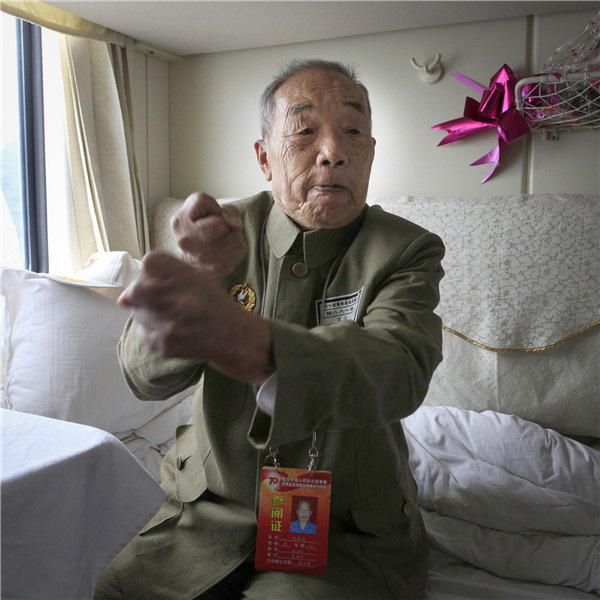A journey through war veterans' memories
 |
|
Qiu Bingji. [Photo by Huo Yan / China Daily] |
They not only took part in the parade, but also went to look for a piece of 'home' in the parade.
On the long train ride between Beijing and the southern city of Nanning, some Chinese war veterans sat and reminisced.
It was Sept 5. Two days earlier, they had all attended China's grand parade to mark the 70 anniversary of the victory of the anti-Fascist war and the War of Resistance Against Japanese Aggression (1937-45).
As they returned home to the Guangxi Zhuang autonomous region, each proudly wore light green military uniform that had been tailor-made especially for the event. On the left breast, their names, rank and units had been stitched in white.
Among them was 101-year-old Song Hongji. He graduated from Guangxi University in 1943 and then volunteered for the Chinese Red Cross in Guizhou province.
The Japanese army invaded the province in November 1944, causing tens of thousands of refugees to flee to the capital, Guiyang, which was still under Chinese control. Song led a team responsible for treating the refugees.
"Many of them had frostbite on their feet. My job was to amputate in the worst cases," he said. "I can't forget one 8-year-old boy whose mother had typhoid. He begged us for the medicine to treat her, but all he could do in the end was pray by her side until she passed away." The retired doctor, who worked at a public hospital in Nanning after the war, said he was happy to take part in the parade because "the Chinese people no longer need to drift from place to place, homeless and miserable".
Xiong Shouming, 99, a flat-fire gunner in Myanmar and Guangxi in 1944, who was also traveling on the train, said he was proud, too, and felt lucky to have survived the conflict.
"My scars are the best military medals. No one can take them away," added Qiu Bingji, 96, a former artilleryman, who was shot twice, in his buttock and foot, while fighting in Yunnan province in 1944.
Wei Zhongcheng, a sergeant in the Chinese army, took part in some of the most bloody battles of 1943 and 1944, including in Binyang, Wuzhou, Liuzhou and Guilin.
"I witnessed a Japanese army unit surrender in Hainan Island in 1945," the 95-year-old remembered. "They went down on their knees in crowds, lowering their heads. It felt like they were kneeling to the whole Chinese people."
Rong Jie, a local government employee who escorted the contingent to Beijing, said that for these elderly soldiers, "home" is a place in their memories where they live with their brothers in arms.
"They not only took part in the parade, but also went to look for a piece of 'home' in the parade," he said. "That sunny Beijing held tens of thousands of parade soldiers, but I'm not sure whether it could hold one old soldier's war memories.
"The war is over for us, but their battle with their memories has never ended."
The elderly men spent much of their journey sitting straight upright, silently looking at the scenery through the train windows. Occasionally, they would look down at the white stitching on their uniform.
It's difficult for a reporter to see into the hearts of these veterans, Rong added. "There is just no space left for people irrelevant to the war."
Zhang Li contributed to this story.
huoyan@chinadaily.com.cn and liyang@chinadaily.com.cn


















